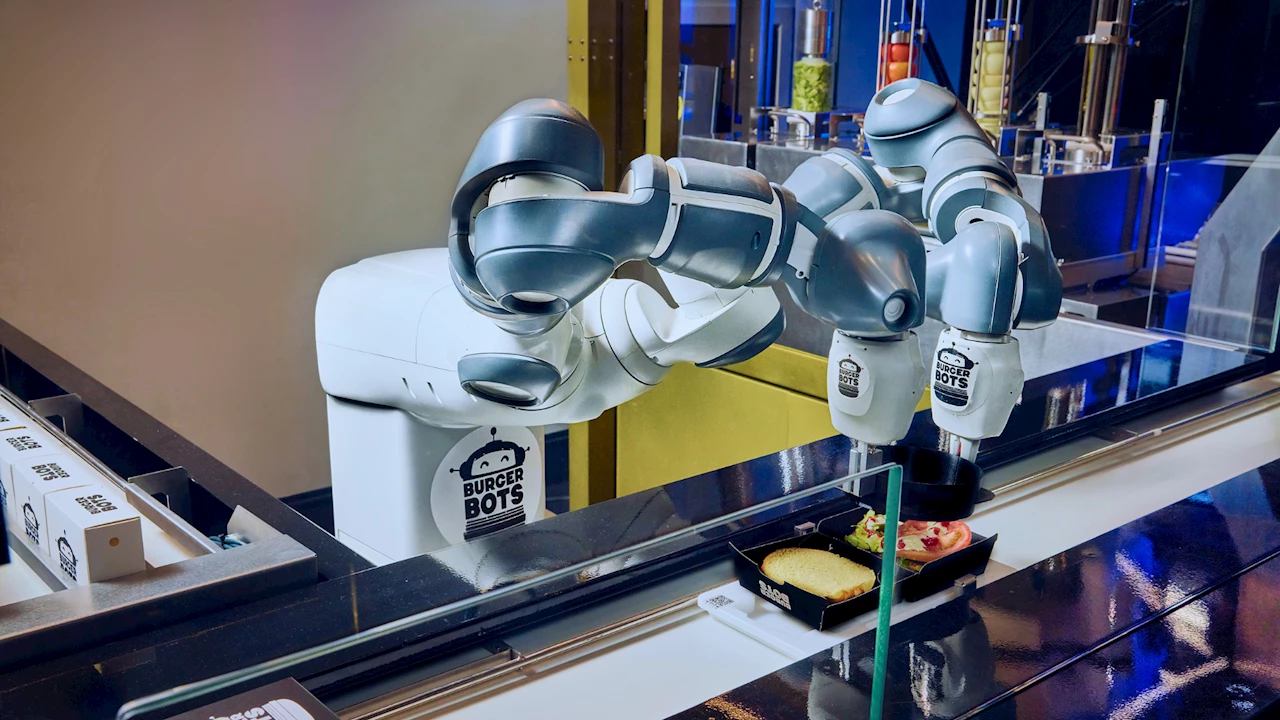It's happening: The robots are taking our jobs. No sick days, bathroom breaks, and no more curly hairs in your buns. Just cold, hard efficiency. More specifically, BurgerBot is a new fast-food joint where robots are doing all the work that humans aren't interested in, like burger assembly lines.
In Los Gatos, California, one of the San Francisco Bay Area's more affluent areas, a shiny new fancy fast-food concept has just popped up inside of one of its trendy upscale brunch spots. ABB Robotics and BurgerBots have teamed up and unleashed a pair of IRB 360 FlexPickers and YuMi cobots (collaborative robots) to slap out some tasty burgers for the masses – in 27 seconds, flat.
These machines don't just stack US$18 all-beef patties, special sauce, lettuce, cheese, pickles, onions on a sesame seed bun with surgical precision onto a QR-coded tray – they are claimed to make perfectly consistent burgers every single time with zero attitude. A far cry from little Billy, who's never had a job before and is on day one of training and experiencing rush hour for the first time.
But before we pull out the protest signs and start a picket line, here's some food for thought: A full staff of humans is employed at the restaurant. The bots (for now) only handle the burger production operation – from grinding the meat and griddling it up to tossing it onto a conveyor belt assembly line. They then assemble the ingredients and kick out a complete, ready-to-eat burger back to a human server to be dished out to a waiting guest.
The robots do the repetitive stuff while supposedly leaving people more time for hospitality and other people-y things.

"The food service industry is dynamic and demanding, and our technology brings industrial-grade consistency, efficiency and reliability to this space," said Marc Segura, President of ABB Robotics Division. "By taking over repetitive and time-consuming tasks, robots allow staff to focus on what matters most – creating memorable dining experiences."
ABB surveyed 1,250 hospitality workers and found that 67% actually want robots to take over boring, gross, and dangerous tasks, and 63% were excited by the prospect of a robot making their job easier. In the end, automation isn't necessarily about replacing humans, it's about upgrading the entire system.
When the washing machine replaced the washboard, people everywhere rejoiced.
BurgerBots isn't just a Silicon Valley tech gimmick. It's designed for scalability, hygiene, and efficiency. ABB's compact robot cell combines the FlexPicker 360 – which grabs and stacks veggies and the like – and the YuMi robot for final assembly as a box rolls down a conveyor. The system uses real-time inventory tracking from lettuce to condiments and everything in between.
BurgerBots has only been open for roughly 24 hours at the time of writing, so time will tell how it performs ... though this isn't ABB's first foray into robotic food prep. In 2021, ABB's IRB 4600 'bot helped power Roboeatz's ARK (Autonomous Robotic Kitchen) in Latvia – claimed to be the world's most advanced autonomous kitchen that can whip up over 1,000 recipes from 80 fresh ingredients.
According to 2025 data from the World Economic Forum, automation and AI could lead to the loss of roughly 92 million human jobs (about 8% of all jobs) by 2030. Towards the top of the potential list are positions like cashiers and fast-food employees. The first tasks to likely replace human employees will be dangerous, repetitive, or tedious jobs – and roles that don't particularly require high social or emotional intelligence.
That being said, on the BurgerBot website, the company is accepting resumes from qualified humans. Just not for the burger-making position.
Source: ABB Robotics




